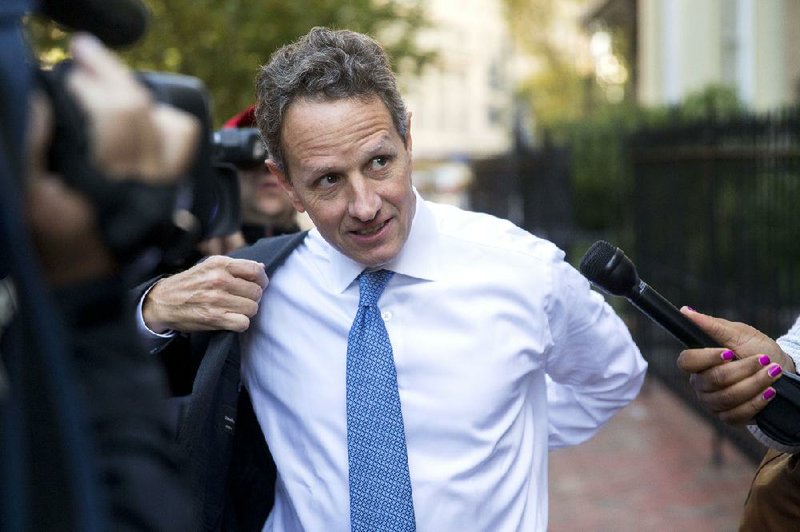The failure in 2008 of American International Group Inc., the world's biggest insurer, would have caused "mass panic on a global scale," Timothy Geithner, the head of the Federal Reserve Bank of New York at the time, testified at a trial over the government bailout of the company.
Geithner, one of three architects of the U.S. response to the 2008 financial crisis, rebutted claims by Maurice "Hank" Greenberg's Starr International Co., then the largest AIG shareholder, that the government illegally took equity in the insurer. Geithner was responsible for setting what a Starr lawyer called "an extortion rate" of 14 percent on an $85 billion loan to AIG.
Letting the company fail "would have been catastrophic for the broader economy," Geithner said Tuesday. "Those options, yes, they existed for us theoretically, but if we had pursued them, they would have been catastrophic in impact."
Starr is seeking at least $25 billion in damages for shareholders at the trial in federal court in Washington. The company claims the government punished AIG, which Greenberg led for almost 40 years, by demanding equity and imposing a far higher interest rate than other bailout recipients, such as banks, had to pay.
Monday, Geithner's predecessor at Treasury, Henry Paulson, finished his testimony well ahead of schedule with short, direct answers such as, "You betcha." In contrast, Geithner has been more cautious, frequently telling Starr's lawyer David Boies that he didn't remember details of AIG's rescue effort.
When asked by Boies how much financial help AIG received as the fiscal and credit crisis deepened in 2008, Geithner responded, "I don't carry those numbers around in my head."
Several copies of Geithner's book, Stress Test, some with pages marked with sticky notes, lay in front of the lawyers, fodder for questioning ahead. Boies used a similar tactic Monday, focusing on key pages in Paulson's book, On the Brink, in questioning him.
Geithner didn't explicitly address whether he thought the government was obligated to save AIG. He said he was involved in determining the terms of the AIG bailout, including the interest rate, the amount of the loan and the requirement for surrender of equity.
Geithner said regulators didn't have a specific type of equity in mind when they began considering a rescue. Boies challenged him with documents, including a news release issued on the night the bailout began, saying the government would receive a warrant, or option to buy shares.
"The precise form of equity was something that was evolving," Geithner testified.
The issue is important because Starr claims the government switched the type of equity it wanted to shares of preferred stock when it realized it couldn't win shareholder approval, as would be required in a deal involving common stock.
At one point, Geithner attempted to take back a statement he'd made earlier about AIG shareholders being "effectively wiped out" by the bailout.
"It's true I used the phrase," Geithner told Boies. "It wasn't completely accurate" because shareholders were provided with a substantial benefit as a result of the rescue, he said.
Geithner testified that an AIG failure would have been "even more damaging" than the collapse of Lehman Brothers Holdings Inc. on Sept. 15, 2008.
AIG shares fell 3.3 percent Tuesday to close at $51.01 in trading in New York.
The case is being heard without a jury by U.S. Court of Federal Claims Judge Thomas Wheeler. Ben Bernanke, the former chairman of the Federal Reserve, is scheduled to take the stand today.
Paulson testified Monday that regulators imposed harsh terms on AIG to send a message to markets that government help would cost them. The government avoided punitive terms for banks because it feared doing so would encourage short sellers to attack them, further destabilizing the economy, said Paulson, who was chief executive officer of Goldman Sachs Group Inc. before being named treasury secretary by President George W. Bush.
Separately on Tuesday, billionaire Warren Buffett, speaking at Fortune's Most Powerful Women Summit in Laguna Niguel, Calif., said he gave Geithner an appraisal of AIG just before its rescue.
Geithner asked "was there enough in the way of value there to warrant such an $85 billion loan" to AIG, Buffett said. "I thought that if they had staying power and, if there weren't things there that I didn't know about, it could be. Probably the underlying subsidiaries would bring $85 billion in a normalized market. And that was that."
The case is Starr International Co. v. U.S., 11-cv-00779, U.S. Court of Federal Claims (Washington).
Information for this article was contributed by Laura Davison and Zachary Tracer of Bloomberg News.
Business on 10/08/2014

